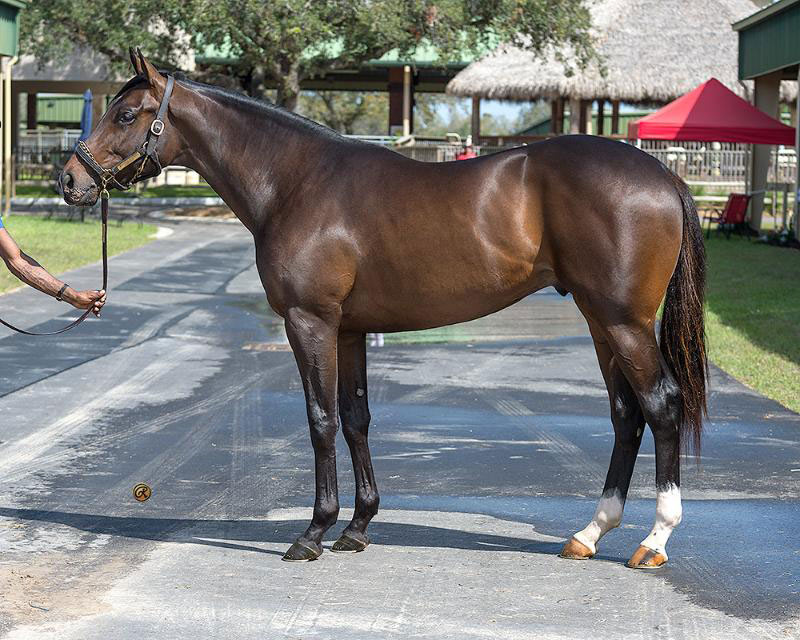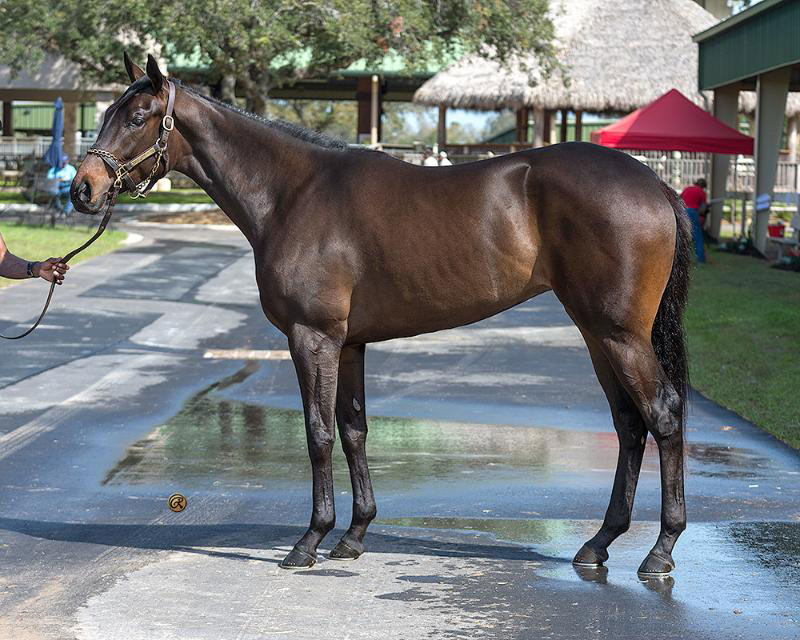Category: Media
OBS CONSIGNMENT: HIP 133 VANCOUVER (AUS) -INDIAN LOVE CALL Filly – breezed 10.1
OBS CONSIGNMENT: HIP 133 VANCOUVER (AUS) -INDIAN LOVE CALL Filly
OBS CONSIGNMENT: Hip 50 – DIALED IN – FACTFULL COLT – Breezed 10.2
Kirkwood Keeps Gallop-Only Program at Gulfstream Sale
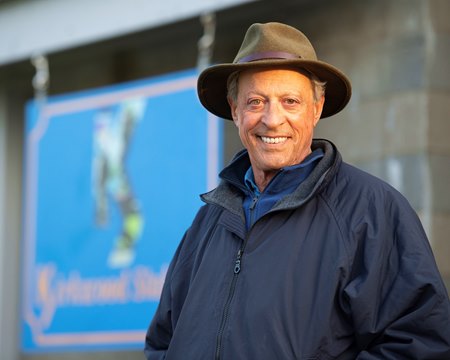
Four previous sale horses asked only to gallop have become black-type performers.
Kip Elser’s Kirkwood Stables will continue to only gallop its entrants during the under tack show for The Gulfstream Sale as the stable has done for the past two years, rather than push the juveniles through a timed workout.
Elser launched this experiment in 2018 at Fasig-Tipton’s select 2-year-olds in training sale at Gulfstream Park following a conversation during the Saratoga Race Course meet with a friend who proposed pinhooking yearlings at the 2-year-olds in training sale without pushing the young horses during the under tack show.
Previous “gallop-only” prospects, offered only at The Gulfstream Sale, had been cataloged as part of the Kirkwood Stables consignment but also under the names Midway Gallop or Gulfstream Gallop so buyers knew what to expect. This year the Gulfstream entrants have been cataloged only under Kirkwood Stables, so Elser wants to be sure buyers know the gallop-only program is still in place.
“We have had very positive results at the sales and on the racetrack,” Elser said. “Maybe we leave a little money on the table, but we are selling every horse and reducing the injury rate.”
During the first two years of the program, Kirkwood offered 14 juveniles, of which eight were sold in the ring for an average of $121,250. The others that did not meet their reserve prices all found new homes through private sales.
Out of these 14 horses, 11 went on to start in a race, and six became winners. Four of the horses became black-type performers, led by winner Splashy Kisses, a daughter of Blame who was second in the Pocahontas Stakes (G2) and third in the Sweet Life Stakes (G3), and Defense Wins, a son of Flatter who was third in last year’s Runhappy Del Mar Futurity (G1). Both of these graded stakes horses are trained by Doug O’Neill. Kirkwood also sold stakes-placed winners Irish Hustle, a daughter of Data Link, and Wicked Slider, a gelding by Wicked Strong .
“The better our results on the racetrack, the better our sales results will continue to be,” Elser said.
At the upcoming April 1 auction at Gulfstream, Kirkwood will offer the following horses as part of its gallop-only program:
- Hip 13, c, Tapit —Jackpot Joanie
- Hip 51, f, Hard Spun —Picturesque
- Hip 63, c, California Chrome —Sacred Forest
- Hip 89, c, Vancouver—Tela
- Hip 117, f, Street Sense —Archers Post
- Hip 138, f, American Pharoah —Choice Pearl
- Hip 146, c, Declaration of War—Compete
- Hip 159, c, Curlin —Desert Classic
OBS MARCH and FASIG TPTON GULFSTREAM NOW ON LINE
Mucho Gusto Works Toward Saudi Cup
Mucho Gusto was a $625,000 two-year-old purchase at Timonium prepared and consigned by Kirkwood
Mucho Gusto, who debuted for his new owner, Prince Faisal Bin Khaled, in the Pegasus, worked six furlongs on a fast track for trainer Bob Baffert. The 4-year-old Mucho Macho Man colt was timed in 1:11 4/5, the fastest time of seven at the distance.
Campaigned by Michael Lund Petersen through his 3-year-old season, Mucho Gusto also placed in the TVG.com Haskell Invitational Stakes (G1) and the Runhappy Travers Stakes (G1).
The Saudi Cup will be run at 1,800 meters (about 1 1/8 miles) at King Abdulaziz Racetrack. Both horses have won at the grade 1 level at the distance
NYRA Manager of Racing Operations Bruce Johnstone Dies
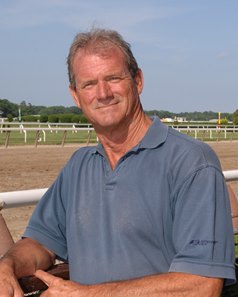
Coglianese Photos
California native moved from training career to work for New York Racing Association.
At NYRA, Johnstone served as the bridge between management, horsemen, and riders, working with everyone from the stewards to jockeys, the gate crew, outriders, and anyone else connected to racing. Imposing at 6’4″ and with a deep, baritone voice, Johnstone stood out for his commanding presence at the track—and for his knowledge, wise counsel, experience, and diplomacy in times of stress.
“Bruce was a true horseman who used the lessons of a lifetime to make all of us better in so many big and small ways,” said NYRA CEO and president Dave O’Rourke. “He was a man of impeccable integrity who was a beloved member of the Thoroughbred racing community here in New York and around the country. Bruce was universally admired for all the right reasons and we will miss him every day.”
NYRA created Johnstone’s position when he joined the organization in 2007. “If I’m talking to a trainer, I know what they’re saying,” he said of his duties in a 2018 interview. “I’ll know how to address a concern or an issue. I have an office, but that’s not where I live.”
Instead, Johnstone could often be found in the paddock, on the edge of the track, the backstretch or the barn area, navigating between groups and attending to any and all issues. Those issues could range from something as basic as a sauna without hot water to pop-up decisions on whether to postpone or cancel racing in poor weather conditions and ensuring the horses were adequately hydrated and sponged down in hot weather.
In 1974, Johnstone went to work at the Phipps Stable with accomplished trainer John Russell and Hall of Famer Angel Penna. Johnstone took out his own training license in 1980. Among his career highlights were wins with Secrettame in the 1983 Shirley Jones Stakes at Gulfstream Park and Buck Aly in the 1986 Bay Shore Stakes (G2). Secrettame, a daughter of Triple Crown winner Secretariat, was owned by Venezuelan owner Jose “Pepe” Sahagun and his Villa Blanca Farms.
While at NYRA, Johnstone also served from 2018-19 as chairman of the famed Aiken Training Center in Aiken, S.C.
Born and raised in Santa Barbara, Calif., Johnstone attended the University of California at Berkeley on an athletic scholarship as a swimmer and a water polo player, and also played rugby. After earning a degree in International Relations and Diplomacy, Johnstone was recruited by the U.S. Coast Guard for the Special Coastal Forces Program, an elite group of college graduates who had been Division 1 athletes.
Johnstone then ran a successful steakhouse, Chuck’s of Hawaii, in his native Santa Barbara, a job in which he worked his way into an ownership stake. The restaurant celebrated 50 years in business in 2017 and remains open.
It was through time spent with his biological father, Charles “Sandy” Johnstone, a New York-based veterinarian, that he turned to horse racing. Visiting his father in both New York and Kentucky, Johnstone, in his mid-20s, became smitten with Thoroughbreds to the point where he made it his career change.
“I got the bug with horses,” Johnstone said in the 2018 interview. “It must have been the pedigree. So I packed up my orange VW van and my two dogs and headed to Kentucky.”
In 1972, he joined trainer Victor J. “Lefty” Nickerson at Elmendorf Stable, where he was a part of one of racing’s biggest upsets, Big Spruce’s victory over Forego in the 1974 Marlboro Cup at Belmont Park.
“I live racing seven days a week,” Johnstone said in 2018. “And when I go to the neighborhood bar to get away from it, I find that people want to talk about what I do—not their jobs, but mine. That’s always fun—and it makes me realize how much I enjoy this life.”
Johnstone is survived by his daughter, Kelly Johnstone.
Details on a memorial service will be announced when available.
Sadly MGSW, Millionaire and GS producer KEEPER HILL died at 20. Proud to have been associated with her early training and to have sold her at Keeneland April Two-Year-Olds in Training Sale 1997 for $250K. Today the BloodHorse
looks back at her shocking Las Virgenes win.
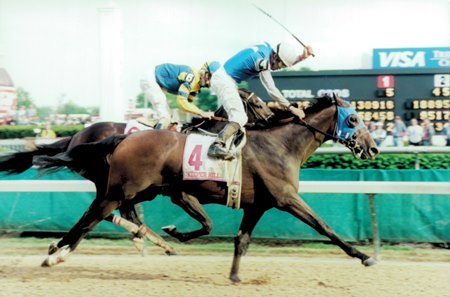
Anne M. Eberhardt
BackTrack: Keeper Hill Shocks in Las Virgenes
Each Thursday, BloodHorse.com presents historic race stories from the magazine.
Ummmmmm. Good tasting canary. Bobby Frankel had everything but yellow feathers sticking out from the corners of his grin after John and Alice Chandler’s Keeper Hill paid $114.20 in winning the $200,000 Las Virgenes Stakes (G1) at a mile on Feb. 15. The daughter of Deputy Minister, fresh from her maiden win, effectively drove a stakes through the heart of the California 3-year-old filly division with a 5 1/2-length victory that discouraged the idea that anything out West would be catching her soon.
“I wanted to see if we had an Oaks-type filly,” Frankel said, explaining his jump to a grade 1 race. He found out he had a Guineas filly in the bargain.
Michael Tabor’s Love Lock, winner of the Starlet Stakes (G1) and Santa Ysabel Stakes (G3), had a throat-hold on the local division, but she got sick and went to the farm. Wayne Lukas tried to replace her with Star of Broadway, the Broad Brush filly who was 3-for-3 in the Midwest. The fans went along for the ride, making her 8-5, while Career Collection went off at 9-5.
Keeper Hill raced three times in the East last year for Shug McGaughey and was never embarrassed. She finished second to Ninth Inning, subsequent winner of the Astarita Stakes (G2). McGaughey, who owns a piece, and the Chandlers, decided Keeper Hill could get more chances on the grass in Southern California than in Florida. Since John Chandler works with Frankel through the Juddmonte Farm horses, Bobby was their man. She broke her maiden first crack on the grass Jan. 14.
“I looked at this race,” Frankel said of the Las Virgenes, “and it looked like there were nothing but sprinters going in there. She’s bred for the dirt, and she had that good race to the filly who won the Astarita. My only real worry was that it might be too short for her. But the Chandlers kept urging me to go ahead and enter her. They gave me the confidence to try.”
Frankel also added blinkers. “The jock had to ride her hard last time,” the trainer said. “The last time I breezed her, with the blinkers, she went much better. I think that made the biggest difference.”
Keeper Hill also got one of those trips sent straight from racing heaven. Breaking from post one, under David Flores for the first time, she hugged the rail behind a fast pace around the turn and onto the backstretch. Up front, Star of Broadway was being pestered by Mishill, whose unbeaten record from Portland Meadows was worth 32-1 in the tote, compared to 56-1 on Keeper Hill.
Flores was able to stay inside without effort as his filly gradually gained on the leaders. Around the final turn, Star of Broadway shook loose as Mishill gave way. Career Collection put in a run on the outside, but it was Keeper Hill on the rail who had the momentum. Flores pulled alongside Star of Broadway to make a race for it. Then suddenly, it was over. Keeper Hill galloped away in the final sixteenth of a mile to win by 5 1/2 lengths, as Star of Broadway saved second over Occhi Verdi. The winner was timed in 1:36.94 and lit up the board.
“Leaving the paddock she was 90-1,” Frankel said with a shake of his head. “I said to myself, ‘If you’re ever gonna bet, now’s the time.'” So, how hard did he play?
“Not a dollar.”
SPECIAL LADY wins 1st out at Newcastle
SPECIAL LADY (Pioneerof The Nile) won her first start racing across the pond at Newcastle Races. She is trained by John Butler and owned by Mrs. Anita Nicol. SPECIAL LADY was prepared at Kirkwood and offered for sale at the 2019 Fasig Tipton Midlantic Two-Year-Olds In Training Sale. We send Congratulations to all her connections!
